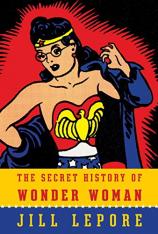The Secret History of Wonder Woman
Review
The Secret History of Wonder Woman
The main factor that separates a good comic from a bad comic (or, indeed, a good novel from a bad novel) is complexity. For example: William Moulton Marston was the creator of Wonder Woman and a vocal advocate of the idea that women should rule the world. However, because he disliked the name “Sadie,” he made his wife --- Sadie Holloway --- change it to “Betty.” Not exactly feminist behavior. Several years later, Marston would give his wife another ultimatum: either she agreed to let Olive Byrne, his mistress (and former student), move in with them, or the marriage was over. As Marston’s editor at DC Comics once said: “He had a rather strange appreciation of women. One was never enough.”
"Ultimately, THE SECRET HISTORY OF WONDER WOMAN is exactly what it says on the tin: a revelation of the sundry factors that led to the creation of one of society’s most durable feminist icons."
In THE SECRET HISTORY OF WONDER WOMAN, Harvard professor and New Yorker contributor Jill Lepore tells the story of Wonder Woman by way of the man who created her, with a hefty dose of early American feminism thrown in. Even before he met Olive Byrne, Marston had been influenced by the ideas and arguments of her aunt, the legendary birth control advocate Margaret Sanger. Marston frequently made statements contending women’s superiority to men. “Women have twice the emotional development, the ability for love, that man has,” he said. Indeed, Wonder Woman was created as “psychological propaganda for the new type of woman who, [Marston believed], should rule the world.”
Of course, it wasn’t that simple. Wonder Woman might have been “as beautiful as Aphrodite, as wise as Athena, as strong as Hercules, and as swift as Hermes,” but she still was left answering phones while the other members of the Justice Society went to fight Nazis in 1942. Furthermore, the extent to which she found herself bound in chains becomes rather more interesting when contextualized by Marston’s own preoccupation with sexual bondage. Indeed, Marston famously described scenes of Wonder Woman’s bondage with precise, almost intimate detail, often devoting dozens of words to describing panels where she is chained, manacled, fettered, gagged, blindfolded and occasionally spanked. Bondage is not incompatible with feminism, of course, but it lends a unique cast to psychoanalysis of the comic.
Though THE SECRET HISTORY OF WONDER WOMAN is largely a biography of the man who created her, Marston’s story --- bondage and all --- is impossible to separate from the rise of feminism and psychology in the early 20th century, two then-inchoate abstractions that have since evolved into major features of our contemporary world. Jill Lepore applies scholarly rigor to a fascinating story, skillfully showing Marston from all angles: academic, psychologist, feminist, polygamist, huckster, fraud and champion --- he often played several roles at once.
Ultimately, THE SECRET HISTORY OF WONDER WOMAN is exactly what it says on the tin: a revelation of the sundry factors that led to the creation of one of society’s most durable feminist icons.
Reviewed by Sam Glass on October 21, 2014
The Secret History of Wonder Woman
- Publication Date: October 28, 2014
- Genres: Cultural Studies, History, Nonfiction
- Hardcover: 432 pages
- Publisher: Knopf
- ISBN-10: 0385354045
- ISBN-13: 9780385354042





